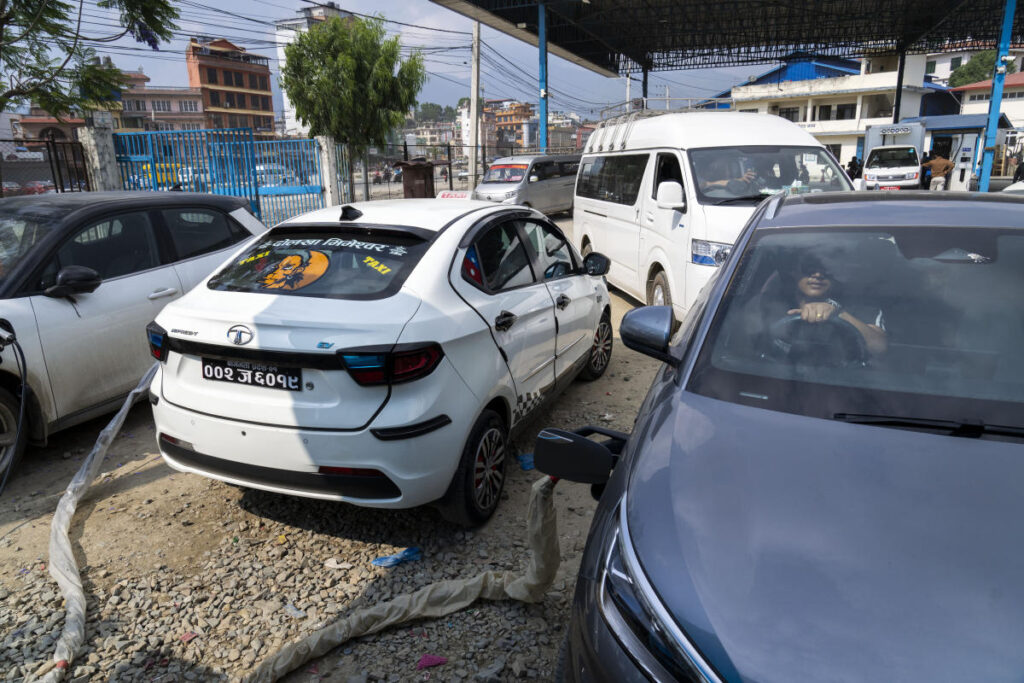KATHMANDU, Nepal (AP) — Nepal’s abundant hydropower is helping the Himalayan country cut its oil imports and clean its air, thanks to a boom in electric vehicle sales.
Nearly all the electricity produced in Nepal is clean energy, with most of it generated by river-fed hydroelectric power stations. Thanks to that abundant energy source, the country is rapidly expanding its charging networks and imports of electric vehicles have doubled in the past two years, customs data show.
The Nepal Electricity Authority estimates that the use of electric vehicles has reduced oil import costs by $22 million per year, and the savings are only increasing.
Access to electricity in Nepal has increased dramatically over the past thirty years as hydroelectric projects were completed. Now all but 6% of the population can reach the country’s fast-growing network. That allows the country to gain an edge over its neighbors in adopting electric vehicles.
Nepal has the peak capacity to produce 2,600 megawatts of power so far and that is increasing as new hydropower plants are completed. A very small amount of power is also generated by solar power plants.
“Our electricity on the grid comes from hydropower, so it is clean energy. And so Nepal is in an ideal position to use electricity to run our vehicles in the best way, which is that the energy source itself is clean. It is not coal, gas, nuclear power or petroleum,” said Kanak Mani Dixit, a leading environmental and civil rights activist.
Official sales data was not available, but Chinese automaker BYD’s Atto 3 and Indian manufacturer Tata’s Nexon appear to dominate electric sedan sales.
Nepal has made encouraging the use of electric cars part of its national commitments to reduce climate change emissions, pledging to increase the number of electric cars to 25% of all car sales by 2025 and to 90% by 2030.
To increase sales, the government imposes lower excise taxes on imported electric vehicles, ranging from 25% to 90%. Import duties on gas and diesel vehicles range from 276% to 329%.
Nepal has also been rapidly adding charging stations
Sagar Mani Gnawali, head of the department responsible for developing electric vehicle charging infrastructure, said Nepal now has 400 charging stations and the number is expected to double within a year.
Jyotindra Sharma, a cardiac surgeon who has been driving an electric car, a 2019 KIA Niro, for four years, says he is happy to know that he is helping reduce the smog that poses serious health risks in the Kathmandu Valley.
“I am very happy with using an electric vehicle because I can contribute to the environment compared to petrol cars,” he said. “The electricity costs for charging and everything are much lower and I got a much, much more luxurious car for the same money. price compared to gas cars,” Sharma said.
EV enthusiasts also include drivers of small public vans who make a living transporting passengers around the city and beyond.
“It is very easy to drive, there is no pollution and it is good for the environment. Not only that, it is also good for the country because the nation’s money does not go abroad to buy oil. There are benefits everywhere,” says Bhakta Kumar Gupta, who drives people from Kathmandu to southern Nepal and back every day.
Gupta replaced his diesel van with an electric car of the same size that can carry ten passengers. It cost him $40 to buy diesel every day. Now he says it costs about $6 to charge his van.
But while hundreds of small EV buses transport passengers on short routes, Kathmandu has very few EV buses and none connect the capital with other cities. Pollution from buses and other vehicles and from burning fuels for cooking and heating made Kathmandu one of the world’s most heavily polluted cities for several days in April after the government warned people to stay indoors.
The switch to more electric vehicles is crucial, says environmental activist Dixit.
“We desperately need that for the sake of our health and for the sake of the health of our economy, the health of individuals and our lungs, as well as our national health,” he said.
___
AP writer Sibi Arasu contributed to this report from Bengaluru, India.







